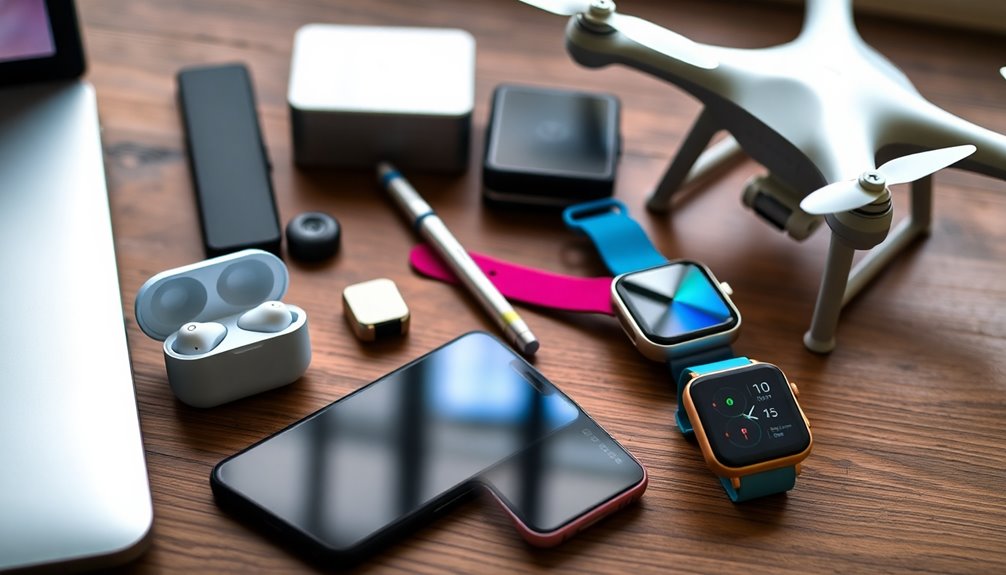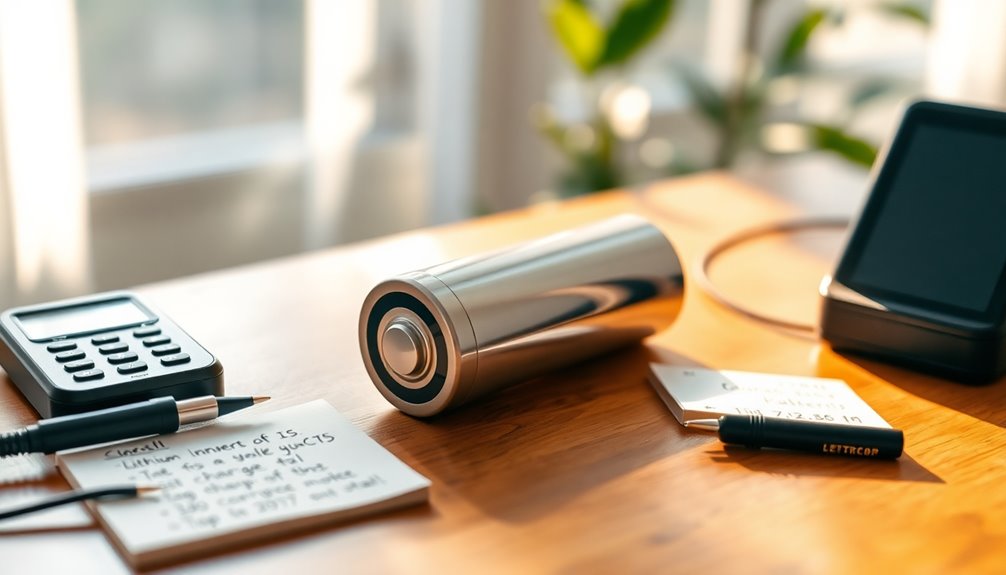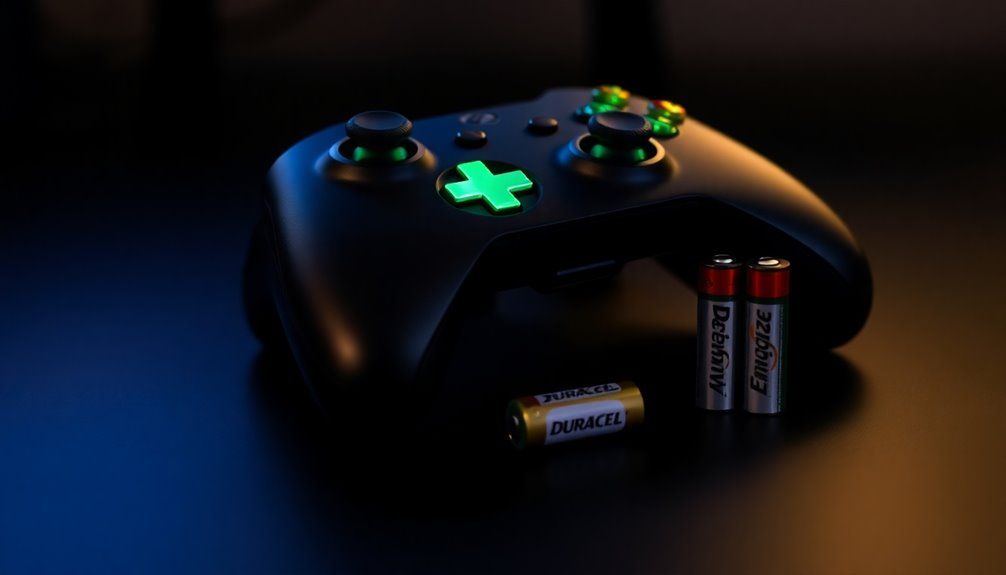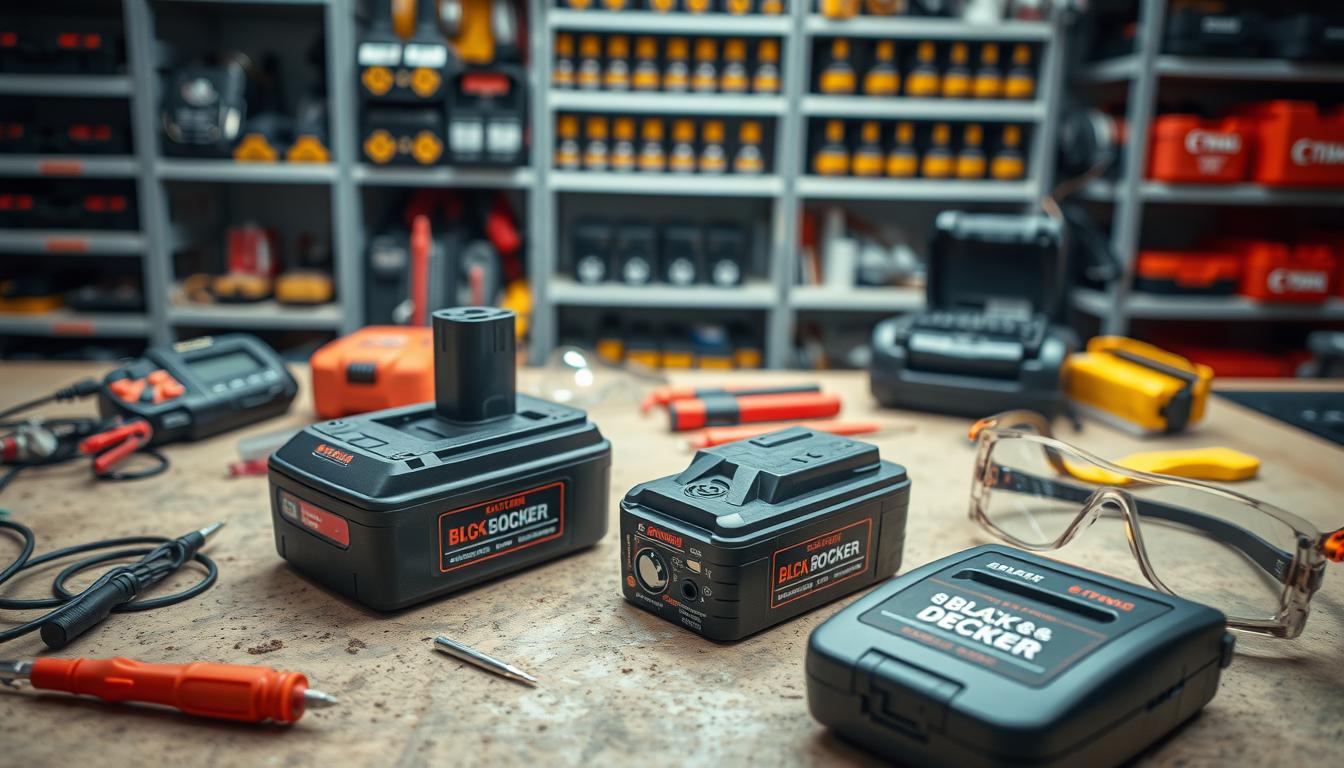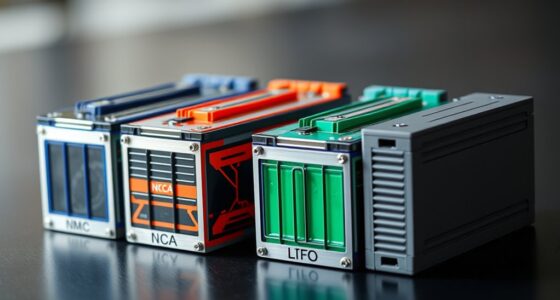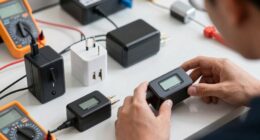Lithium batteries power a variety of everyday devices, making them indispensable in your life. You'll find them in smartphones, laptops, and digital cameras, enabling long usage times and quick charging. They're also essential for wearables like fitness trackers and smartwatches, keeping you connected and informed. Beyond consumer electronics, lithium batteries support portable medical devices and electric vehicles, promoting health and mobility. Their lightweight design enhances performance and efficiency across applications. With so many uses, it's clear these batteries play a significant role. Stick around, and you'll discover more about their impact on technology and daily life.
Key Takeaways
- Lithium batteries power a variety of everyday electronics, including smartphones, laptops, and digital cameras for their high energy density and long-lasting performance.
- Portable medical devices, such as pacemakers and oxygen concentrators, rely on lithium batteries for reliable and efficient operation.
- Electric vehicles (EVs) utilize lithium batteries for extended driving ranges, lightweight design, and quick charging capabilities.
- Wearable technology, including fitness trackers and smartwatches, benefits from lithium batteries' low self-discharge rate and long usage times.
- Cordless power tools are powered by lithium batteries, enabling efficient performance and portability for various tasks.
Characteristics of Lithium Batteries
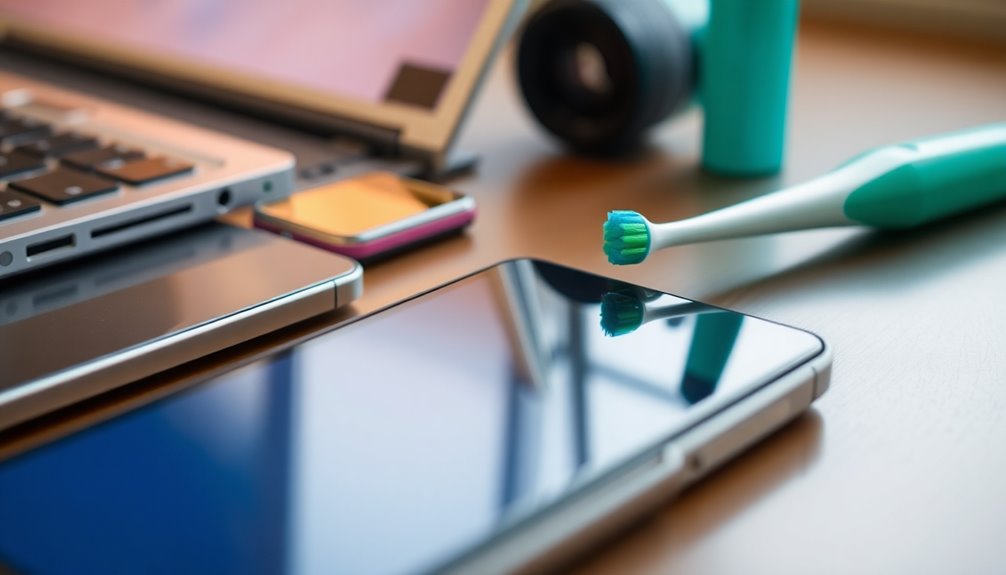
When you consider everyday devices, lithium batteries stand out for their impressive characteristics.
These rechargeable batteries offer long-lasting power, making them ideal for consumer electronics like smartphones and laptops. With a high energy density, they can store up to 150 watt-hours/kg, allowing for compact, portable power solutions.
They're designed to endure between 1,000 to 2,000 charging cycles, ensuring a long life and reliability in various applications. Thanks to their low self-discharge rate, lithium batteries retain their charge longer than traditional batteries, which is vital for energy storage systems and backup power.
Plus, their fast charging capabilities minimize downtime, enhancing your experience with devices that depend on efficient energy delivery.
Everyday Electronics With Lithium
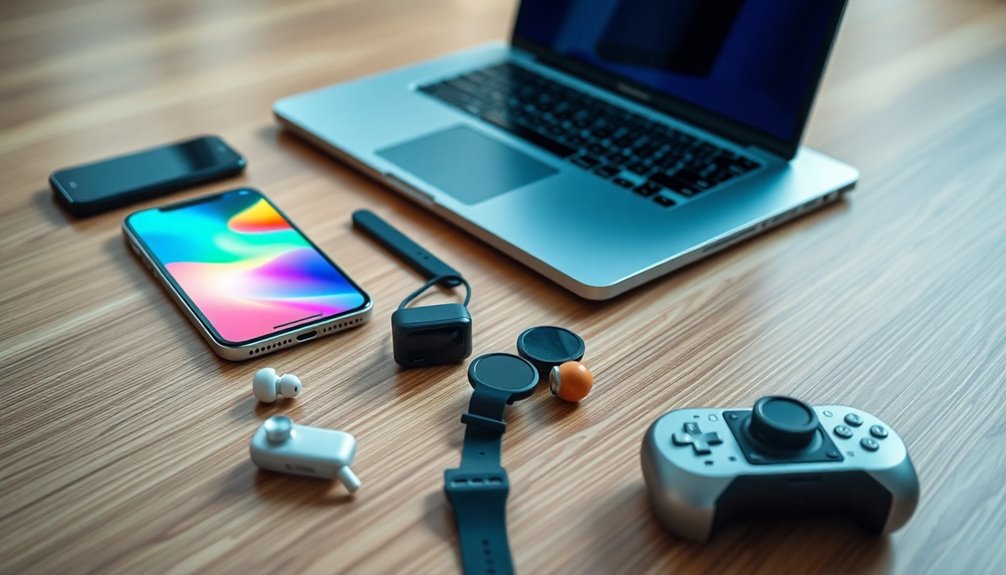
As you navigate your daily life, you'll likely notice how integral lithium-ion batteries are to the electronics you rely on.
These batteries power your smartphones, laptops, and digital cameras, thanks to their high energy density and lightweight design. They enable fast charging and long usage times, making them perfect for portable devices that you take on the go.
Wearable devices like fitness trackers and smartwatches also depend on lithium-ion technology, offering extended battery life in a compact form.
Even cordless power tools utilize these rechargeable batteries, ensuring efficient performance for DIY enthusiasts and professionals alike.
The prevalence of lithium-ion batteries in everyday electronics enhances your user experience, reflecting their significance in modern life.
Medical Device Applications
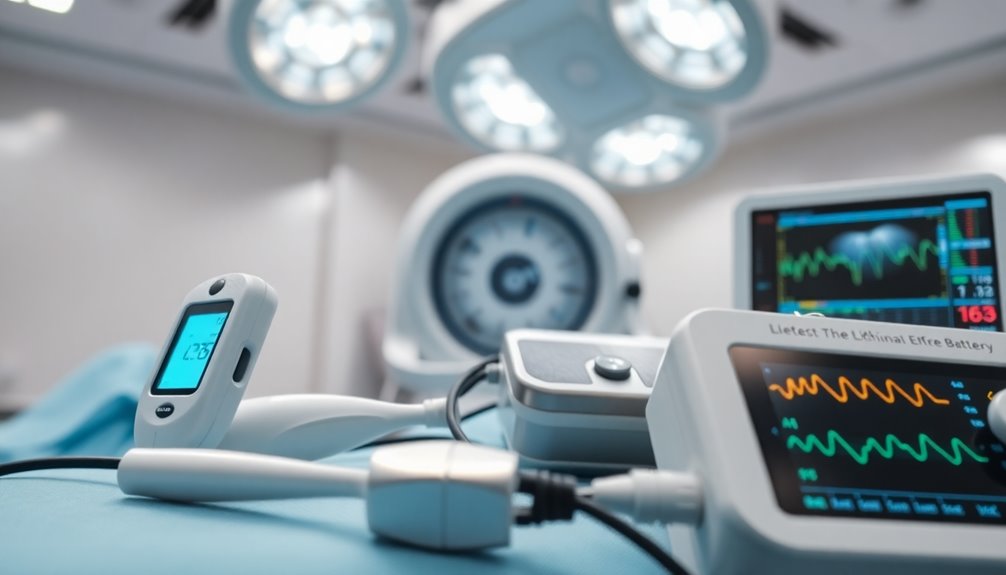
Lithium-ion batteries play an essential role in powering medical devices that you might encounter in healthcare settings. Their high energy density and lightweight design make them ideal for portable medical applications, ensuring reliable power for various critical equipment.
- Pacemakers with 7-8 year battery life
- Oxygen concentrators for breathing assistance
- Cardiac monitors for heart health tracking
- Wearables like fitness trackers for crucial signs monitoring
These batteries enable consistent performance, allowing devices to be smaller and more efficient.
The lightweight design enhances usability, especially in emergencies, so medical professionals can easily transport and operate these life-saving devices.
With lithium-ion technology, you can trust that essential medical devices will function whenever you need them.
Mobility Solutions Powered by Lithium
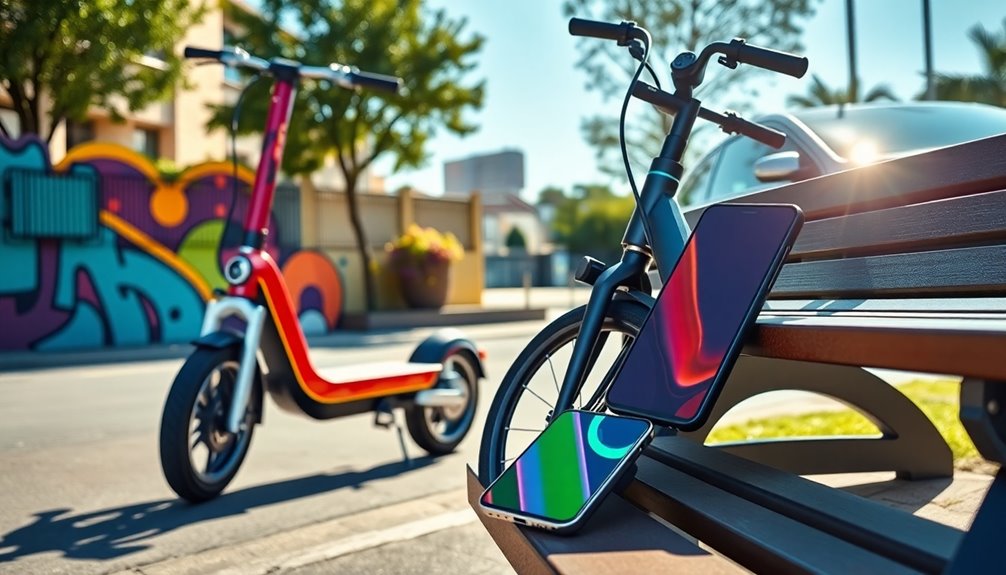
When you think about mobility solutions, electric vehicles and mobility aids powered by lithium-ion batteries come to mind.
These devices not only enhance your mobility but also offer lightweight designs and fast charging capabilities for convenience.
As you explore this growing sector, you'll see how lithium technology is reshaping the way we move.
Electric Vehicles Overview
Electric vehicles (EVs) are revolutionizing transportation with their efficient use of lithium-ion batteries.
These batteries not only provide a lightweight design and high energy density, but they also enable longer driving ranges and faster charging times.
Here's what makes them stand out:
- Extended driving ranges, often over 300 miles per charge
- Fast charging technology for minimal downtime
- Significant reduction in greenhouse gas emissions
- Advances in battery technology for greater efficiency
With the growing demand for electric cars, the adoption of lithium-ion batteries is a key player in promoting sustainable transportation.
As technology improves, expect even higher energy density and reduced costs, making electric vehicles an increasingly attractive choice for eco-conscious drivers.
Mobility Aids Functionality
The advancements in lithium technology aren't just transforming electric vehicles; they're also enhancing mobility aids for those facing movement challenges.
Lithium-ion batteries power portable mobility scooters and electric wheelchairs, making them easier to handle and use. With extended ranges, some scooters can travel up to 12 miles on a single charge, giving you the freedom to explore without worry.
Fast charging capabilities minimize downtime, letting you quickly recharge when needed. The lightweight design of these batteries improves vehicle efficiency, making them ideal for personal mobility solutions.
Additionally, lithium-ion technology is being adopted in e-bikes and e-scooters, providing eco-friendly options that support urban mobility while enhancing your independence.
Energy Storage Innovations

You're likely aware that lithium batteries play a vital role in integrating renewable energy sources like solar and wind into our daily lives.
Their ability to store energy efficiently supports smart grid applications, making energy supply more reliable and flexible.
As you explore energy storage innovations, you'll see how these advancements are reshaping the way we harness and utilize renewable energy.
Renewable Energy Integration
As renewable energy sources like solar and wind become more prevalent, integrating efficient energy storage solutions has never been more essential.
Lithium batteries are at the forefront of this integration, optimizing energy storage by capturing excess power from solar panels and wind turbines. Their high energy density allows for compact solutions, making the most of limited space in residential systems.
- Quick charging capabilities enhance grid stability.
- Balancing supply and demand improves energy management.
- Innovations in recycling boost sustainability efforts.
- They recover valuable materials for future use.
Smart Grid Applications
Integrating renewable energy sources naturally leads to advancements in smart grid applications, where lithium batteries play an integral role.
These batteries provide effective energy storage solutions, balancing supply and demand from renewable sources like solar and wind. Thanks to their high energy density, lithium-ion batteries enable large-scale energy storage systems to capture excess energy generated during peak production times for later use.
Their rapid charging capabilities allow these systems to swiftly respond to grid fluctuations, enhancing overall reliability and stability. Homeowners benefit from lithium batteries too, as they store solar energy for use during peak demand or power outages.
Continuous innovations in lithium battery technology further improve efficiency, driving advancements in smart grid infrastructure and aiding the shift toward cleaner energy systems.
Fire Safety Considerations
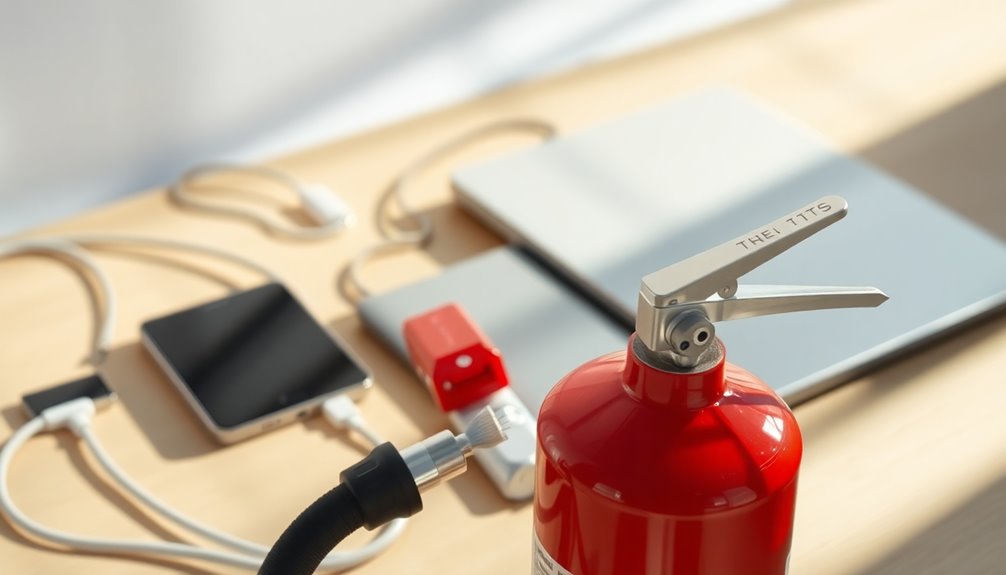
While lithium-ion batteries power many everyday devices, they also pose significant fire risks if not handled properly. To guarantee fire safety, it's vital to follow these guidelines:
- Use proper storage practices for batteries.
- Maintain devices regularly to prevent hazards.
- Be aware of thermal runaway risks in e-bikes and backup power systems.
- Educate yourself on fire safety protocols.
Increasing incidents highlight the need for vigilance in environments like schools and repair stores. Neglecting battery maintenance or improper disposal can lead to dangerous situations.
Staying informed about fire safety regulations is essential to mitigate risks associated with lithium-ion batteries. By prioritizing education and adhering to safety measures, you can help prevent incidents and protect yourself and others.
Frequently Asked Questions
What Everyday Items Have Lithium Batteries?
You might be surprised by the everyday items that use lithium batteries. Your smartphone, laptop, and tablet all rely on them for quick charging and portability.
Don't forget about your smartwatch and fitness tracker; they depend on lithium batteries for lightweight design and long-lasting power.
Even your digital camera benefits from lithium-ion technology, allowing for extended shooting sessions.
Plus, if you enjoy DIY projects, your cordless power tools are likely powered by these efficient batteries.
What Devices Are Powered by Lithium Batteries?
You'll find lithium batteries powering many devices you use daily. Your smartphone, laptop, and tablet rely on their lightweight design and high energy density for performance.
If you wear a smartwatch or use a fitness tracker, they're likely using lithium-ion technology too.
Even your cordless power tools benefit from these batteries, providing portability and efficiency.
Plus, electric vehicles utilize them for eco-friendly driving.
Their versatility spans from medical devices to renewable energy solutions.
What Everyday Items Is Lithium Found In?
Think of lithium as the silent engine behind many of your daily essentials, powering them with a quiet confidence.
You'll find lithium in your smartphone, laptop, and tablet, keeping you connected and productive.
It's also nestled in smartwatches and fitness trackers, tracking your health with ease.
Even your cordless power tools rely on it for freedom of movement, while electric vehicles harness its energy for smooth rides.
Lithium's everywhere, making life a little brighter.
What Uses Lithium-Ion Batteries in Daily Life?
You'll find lithium-ion batteries powering many devices in your daily life.
Smartphones let you communicate easily, while laptops and tablets keep you productive for longer without constant recharging.
When capturing memories, digital cameras provide the energy needed for high-resolution photos.
Your smartwatch or fitness tracker stays lightweight and functional with this technology.
Even your cordless power tools rely on lithium-ion batteries, giving you the efficiency you need for DIY projects.
Conclusion
In the world of technology, lithium batteries are the vibrant heartbeat, powering everything from your smartphone to life-saving medical devices. As you embrace these everyday wonders, remember that they're not just energy sources; they're the silent companions in your daily adventures. However, like a firefly in the night, they require careful handling to shine safely. So, as you harness their energy, stay informed and enjoy the spark they bring to your life!

